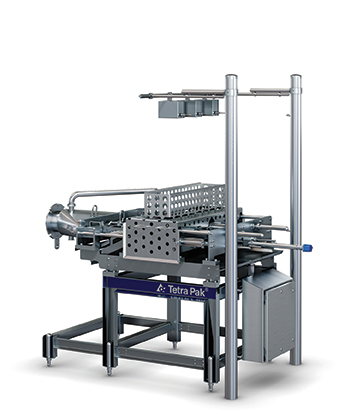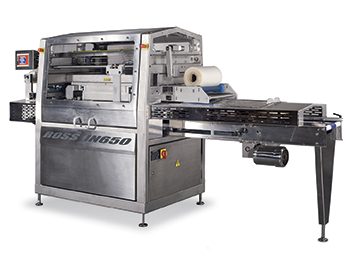 |
|||


|
 |


|
|

Exact-weight, flexible cheese packaging solutions in demand to ensure safety, less handlinging
By Alyssa Mitchell
 Photo courtesy of Tetra Pak Photo courtesy of Tetra Pak |
| EXACT WEIGHT STRING — Tetra Pak’s Exact Weight String machine offers precision molding and cutting of String to reduce waste, resulting in cost savings for customers, the company says. |
 Photo courtesy of Reiser Photo courtesy of Reiser |
| ROSS TRAY SEALER — Reiser’s Ross tray sealers, such as the Ross IN650 pictured above, produce modified MAP and VSP from preformed trays of almost any size or shape. These systems produce leak-proof, tamper-evident packages with greater seal integrity and extended shelf life. |
MADISON, Wis. — As consumer appetites for snack and single-serve cheese and dairy products continue to grow — and cheese and deli departments increasingly are seeking pre-packaged, exact-weight cheeses to cut down on handling in-store in the wake of COVID-19 — cheese and packaging companies are well-positioned to meet both of these needs with flexible, smaller packaging solutions.
Leading public health organizations continue to affirm that it is highly unlikely that people can contract COVID-19 from food or food packaging. The World Health Organization recently stated there is no evidence to date of viruses that cause respiratory illnesses being transmitted via food or food packaging, and the Centers for Disease Control and Prevention (CDC) states that the risk of infection by the virus from food products, food packaging or bags is very low. CDC also states that currently, no cases of COVID-19 have been identified where infection was thought to have occurred by touching food, food packaging or shopping bags.
The U.S. cheese and dairy industry experienced a shake-up in supply and demand earlier this year when restaurant closures led to increased demand for cheese and dairy at retail and a loss of demand in foodservice. Meanwhile, cheese and deli departments across the country are taking every precaution to reduce staff handling of cheese in-store, requesting that more suppliers pre-cut and wrap their own products or ship in smaller, single-serve portions ready for retail sale. These smaller, ready-for-sale sizes also are needed for e-commerce sales, which have risen substantially during the pandemic.
Mike McCann, packaging specialist with Reiser, Canton, Massachusetts, says the company already was looking into offering smaller retail packaging options when COVID-19 hit.
“Since the pandemic started, there’s been a boom of activity from all levels of the cheese industry — players large and small — with wanting to provide smaller retail packages. It’s been really good for us,” he says.
McCann notes exact-weight packaging helps to reduce or totally eliminate the hands-on aspect of product handling.
“With automated slicing and even robotic loading, you can be sure no human hands have touched the cheese,” he says.
As snacking occasions are on the rise and in the wake of COVID-19, there has been increased demand for smaller packaging sizes as people’s lives have been disrupted and many families are looking for convenient snacks that are safe, says Todd Purkey, director of packaging, Sargento Foods, Plymouth, Wisconsin. For example, Sargento Snack Bites feature two flavors of cheese in bite-size pieces packaged in a 1-ounce pack for a quick snack. The packs are sold as a set of six at retail.
“Sargento Snack Bites are an ideal solution as a simple, yet delicious snack that easily fits into everyone’s ‘new normal,’ Purkey says. “Our unique Snack Bites package makes it easy for anyone to quickly grab a satisfying snack during their hectic schedule.”
Michael Roslen, marketing manager, Sargento Foods, adds that, as a pioneer in innovative packaging for natural cheese, Sargento has the expertise to provide food-safe packaging that consistently delivers a predetermined net weight to meet consumer needs.
“This provides our consumers with confidence that they will receive a safe product of the highest quality,” Roslen says. “We hold ourselves to the highest standards when it comes to responsible sourcing throughout our supply chain. We only use packaging solutions that will maintain their integrity as our products make their way through the supply chain from our vendors to our retail partners and, ultimately, to our consumers.”
Tetra Pak, one of three companies in the Tetra Laval Group, based in Sweden, prides itself on its range of cheese and dairy processing and packaging solutions with robust, shelf-stable packaging options.
“Generally, when it comes to packaging, we generate end-to-end solutions around our machinery, from low-capacity to high-capacity lines,” says Aaron Nutsford, commercial operations, Cheddar and Mozzarella, for Tetra Pak.
Nutsford notes during the pandemic, there has been positive growth in demand for single-serve and convenience packaging for cheese. The demand also is driven by a trend toward cheese as a healthy snack for children and adults alike.
Many of Tetra Pak’s packaging offerings yield a longer shelf life, which gives customers additional peace of mind, he adds.
“It can give customers some assurance, especially with loss of power during a storm or hurricane,” Nutsford says. “With the panic buying we saw earlier this year, particularly the spike in e-commerce, we were able to provide packaging that can be delivered without refrigeration. Our packaging material is very safe, protecting what’s inside as well as outside.”
One of the company’s offerings to meet snack-sized demand is Tetra Pak’s Exact Weight String machine, offering precision molding and cutting of String.
In contrast to a traditional extrusion process, this system eliminates the risk of diameter and length variations, the company says. The extrusion tube feeds directly into the mold cavity, maintaining the exact volume required. This method reduces variations in output to below 0.5 grams — well below the industry average, Tetra Pak says.
In addition, the unit is built on modules, which means that when customers want to produce sticks of a different cheese diameter, only the three mold cassettes and pins need to be changed. The switch can be performed in just a few minutes.
One of the hallmarks of the machine is its ability to dramatically reduce waste due to the precision cutting, resulting in cost savings for customers, Nutsford says.
“Specifically with String cheese, with exact-weight systems, we don’t have to account for variations in terms of under weights or over weights, resulting in great savings,” he says. “Obviously the cheese has a long shelf life, and it’s also packaged at the point of manufacture, so everything is double- and triple-packed. The String is packaged individually and put in a bag and then a box, so it’s very robust for the supply chain from a safety standpoint.”
He adds Tetra Pak provides a range of systems for String cheese, not only classic String but also twist-type products, and Tetra Pak provides these solutions to all the major cheese producers.
At Reiser, customers can choose from a variety of flexible packaging options, including the company’s full line of form/fill/seal, tray seal and vacuum chamber packaging machines.
“There’s a constant evolution across our product line as we’re reformulating packaging for cheese and making cheese snack packages,” McCann says, noting Reiser can offer solutions for cheese packaging sizes ranging from 40-pound blocks to “the smallest of diced chunks of cheese you can imagine.”
Reiser’s Repak line features a new generation of horizontal form/fill/seal equipment for food packaging. The machines are used for all types of cheese products and can produce vacuum and modified atmosphere packages (MAP) including flexible and semi-rigid materials, as well as Vacuum Skin Packages (VSP) and packages with formed top webs. Machines can be manually and automatically loaded and are built for sanitation and access for maintenance.
Meanwhile, Reiser’s Ross tray sealers produce modified MAP and VSP from preformed trays of almost any size or shape, McCann notes.
Ross MAP and VSP systems produce leak-proof, tamper-evident packages with greater seal integrity and extended shelf life, he says, adding they are ideal for all types of cheese packaging.
Ross also manufactures a variety of tray sealers, including machines that feature an inline design, as well as machines that use a tray carrier design.
All inline models are designed to allow rapid tool changeover between tray sizes, reducing downtime and maximizing production efficiency, while the carrier-design tray sealers use a customized tray carrier to perfectly fit each tray. The tray carriers positively position the trays in the sealing station, which leads to consistent seals and virtually eliminates leaks.
McCann notes that during the pandemic, many of Reiser’s customers have had to pivot in order to supply more retail-ready products.
“Much of this business was in foodservice, and now all of a sudden they have to adjust to go right to market and a retail approach,” he says. “It’s a big adjustment, but we’re really well-positioned to help. We have larger machines but can do smaller versions to help our smaller customers. We are able to supply the proper level of equipment related to volume.”
When it comes to packaging material safety, stakeholders point to flexible film as a top choice.
Sargento’s sliced, shredded and snack cheeses use flexible film packaging, while its Balanced Breaks snacks and new Snack Bites use unique trays with film lidding.
“Each of these packages is optimized to maintain the quality and freshness of the product within,” Purkey says.
“Sargento uses materials that are designed to maintain the integrity of our products throughout their life cycle,” he adds. “We understand that this requires a balance of the right amount of packaging, a specification that promotes extended shelf life, a functional design as it relates to size, shape and opening, and a package that is attractive to consumers as they shop for their favorite Sargento products.”
“As a family-owned company, safety is our top priority,” Roslen adds. “Sargento has been producing safe, quality products for 67 years. Our production processes consistently meet or exceed industry standards. As such, Sargento is well-prepared to continue meeting the safety standards for our products and packaging, even during these challenging times.”
CMN
| CMN article search |
|
|
© 2025 Cheese Market News • Quarne Publishing, LLC • Legal Information • Online Privacy Policy • Terms and Conditions
Cheese Market News • Business/Advertising Office: P.O. Box 628254 • Middleton, WI 53562 • 608/831-6002
Cheese Market News • Editorial Office: 5315 Wall Street, Suite 100 • Madison, WI 53718 • 608/288-9090